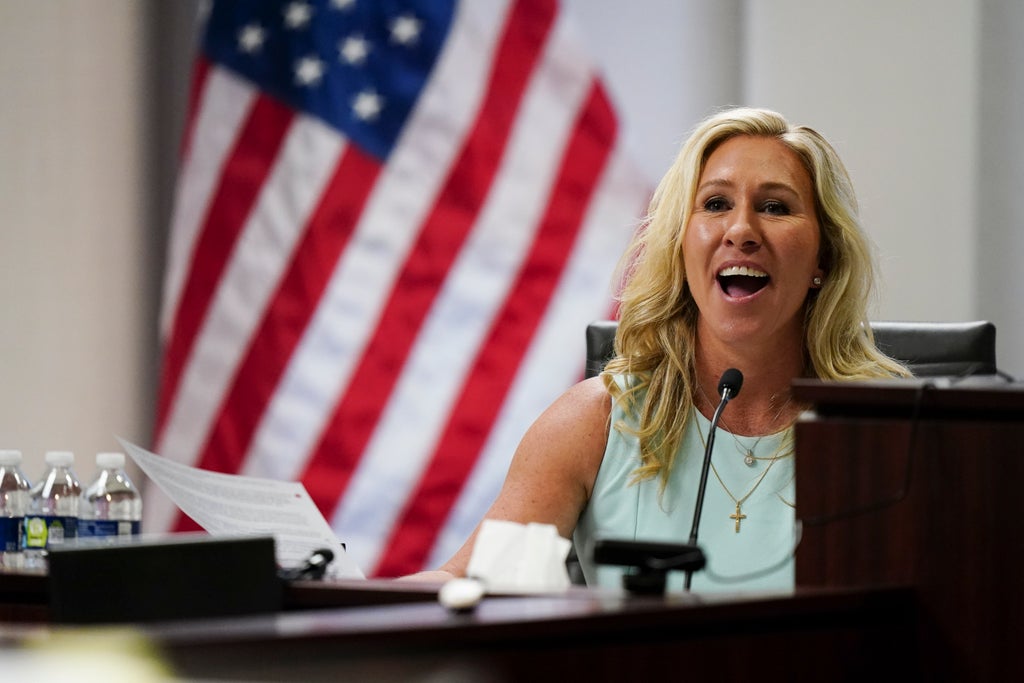
Georgia Representative Marjorie Taylor Greene on Friday claimed not to remember who she spoke to or what she said or did in the weeks between former president Donald Trump’s 2020 election loss to Joe Biden and the 6 January 2021 attack on the Capitol during a court hearing which will determine whether she is eligible to appear on the ballot in Georgia this year.
Ms Greene, who testified under oath in an administrative hearing as part of a lawsuit brought by Georgia voters who say she is ineligible to serve because she supported the pro-Trump mob that attacked Congress in hopes of preventing certification of Mr Biden’s 2020 election victory, used the phrase “I don’t recall” in excess of 50 times in response to a range of questions regarding her conduct and public statements during the run-up to the insurrection.
At times, she claimed to have trouble recalling basic details about who was responsible for posts made to her now-suspended personal Twitter account and her Facebook account.
The Peach State Republican also had to backtrack when she was asked if she’d ever called House Speaker Nancy Pelosi a “traitor” to the United States.
When attorney Andrew Celli asked her if she’d ever made such a statement, she quickly shot back: “No, I haven’t said that”.
But after he called for an exhibit to be presented, she quickly interjected: “Oh no, wait, hold on now!
“I believe that by not securing the border that violates her oath of office,” she said.
Mr Celli proceeded to present a video of Ms Greene speaking at a 2019 event, in which she accused Ms Pelosi of being “guilty of treason” and called for her to receive the death penalty as a result, at which point she admitted having made such a statement.
The seven-hour hearing took even more bizarre twists and turns over the course of Ms Greene’s testimony, including one head-scratching moment in which Mr Celli asked her if she’d lifted a phrase in one of her videos about the American people going “quietly into the night” from the 1996 film Independence Day, and followed up his question with a clip from the Roland Emmerich-directed blockbuster in which the US president, played by Bill Pullman, speaks to a group of fighter pilots who were preparing to fight back against an alien invasion.
After that moment of levity, the questioning turned deadly serious once more, and Ms Greene’s inability to remember basic details returned.
When Ms Greene was asked whether she’d discussed the possibility of then-president Donald Trump invoking martial law to prevent Mr Biden from being sworn in as president — a course of action advocated for by numerous high-profile Trump allies including attorney Sidney Powell and ex-White House national security adviser Michael Flynn — Ms Greene’s attorney, James Bopp Jr, attempted to claim that she could not answer the question because such an answer would violate Mr Trump’s executive privilege, though the objection was quickly overruled.
Still, her answer to nearly every question remained the same: “I don’t recall”.
In closing arguments, Mr Celli said Ms Greene’s repeated references in public statements and social media to “1776” — the beginning of America’s war of independence against Great Britain — constituted a call for violence, a “plan B” if Republican objections to electoral votes in favour of Mr Biden did not succeed in derailing certification.
Referring to Ms Greene’s use of the phrase “this is our 1776 moment” in a 5 January 2021 Newsmax interview, Mr Celli said it was a call to violence directed towards the throngs of Trump supporters who’d come to Washington.
“She was one of several leaders who gathered the kindling, who created the conditions” for violence that day, he said. “Then she dropped the match”.
The judge requested written briefs by next week and said he was likely to make a decision a week after that.







